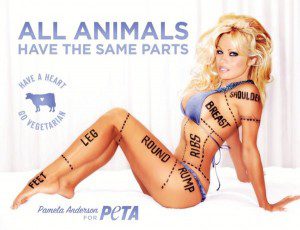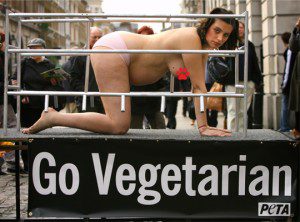Most people I encounter on a daily basis recognize People for the Ethical Treatment of Animals (PETA) as pretty “out there” at least in their methods, if not their message. I respect the group’s passion for animal rights, though I don’t agree with all of their arguments, and like many advocacy groups, I think their single-mindedness sometimes compromises what might otherwise be a more popular case for ethical treatment of animals.
 A while back, PETA began placing ads in print media and online that were very sexually provocative, presumably with the intent of creating a buzz around their primary mission. The fans continue to be flamed, and now PETA is going a step further by announcing they will soon launch their own “Porn Site” with the anti-fur, pro-vegan themes woven throughout.
A while back, PETA began placing ads in print media and online that were very sexually provocative, presumably with the intent of creating a buzz around their primary mission. The fans continue to be flamed, and now PETA is going a step further by announcing they will soon launch their own “Porn Site” with the anti-fur, pro-vegan themes woven throughout.
Yes, we all know that sex sells, particularly in today’s western culture. We are, at the same time, obsessed with sex and ashamed of it. We cling to curious Puritan values, while also bombarding pornography sites by the billions every month. We seek to deny our sexuality, while also flaunting it without reservation.
to curious Puritan values, while also bombarding pornography sites by the billions every month. We seek to deny our sexuality, while also flaunting it without reservation.
I think I understand why PETA has resorted to what I consider “lowest common denominator” marketing, but I think they bear particular responsibility in the approach they take to engage the public, specifically because of what their mission is. Though they claim to be fanatical about ensuring that animals are treated with the utmost of ethical concern, the same ethics do not seem to apply to human beings.
Employing figures like Playboy playmate Pamela Anderson and adult film star Sasha Gray in their campaigns suggests to some observers that it’s acceptable to objectify people – and women in particular – other ends. To reduce them to two-dimensional sexual symbols undermines the very ethic that PETA supposedly stands for.
 I understand that these models agree to pose for these photographs, and that there’s a case to be made that their willingness to participate separates them from the animals who do not choose to be exploited. But complicit exploitation is still that: exploitation. And while some have found a way to make a rather comfortable living through complicit exploitation, that doesn’t make it right.
I understand that these models agree to pose for these photographs, and that there’s a case to be made that their willingness to participate separates them from the animals who do not choose to be exploited. But complicit exploitation is still that: exploitation. And while some have found a way to make a rather comfortable living through complicit exploitation, that doesn’t make it right.
I was particularly bothered by this image of an expectant mother, corralled in a stall like a cow, stripped bare and set out in the public forum for people to ogle. Yes, she did so willingly (though I expect no one consulted the unborn child in their feelings about it), but the very nature of this image is dehumanizing. And maybe I’m missing a larger point, but if PETA can’t first demonstrate what I would consider a reasonable degree of respect for women, I have a difficult time taking anything else they say with anything other than a giant grain of salt.
And before they come, yes, I am sure there are those who will condemn me for re-posting these images. Am I contributing to the problem by giving them a larger platform? Am I simply reducing myself to the same sort of “lowest common denominator” sensationalism to get attention? All fair enough to argue. But as a Christian, I believe part of my responsibility is to identify wrongs out into the light. In doing so, it’s my hope that such images will be seen in a new context: hopefully one that will lead to a culture in which we advocate for a more ethical treatment of humans in general, and more specifically, women.











